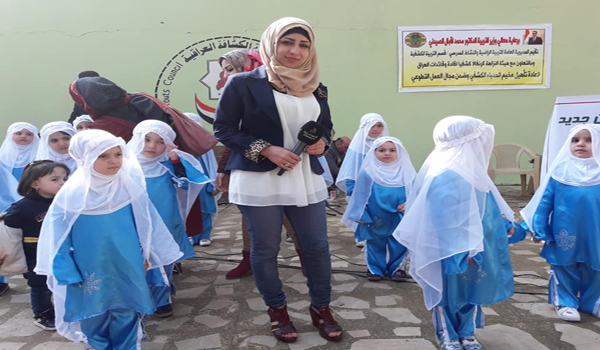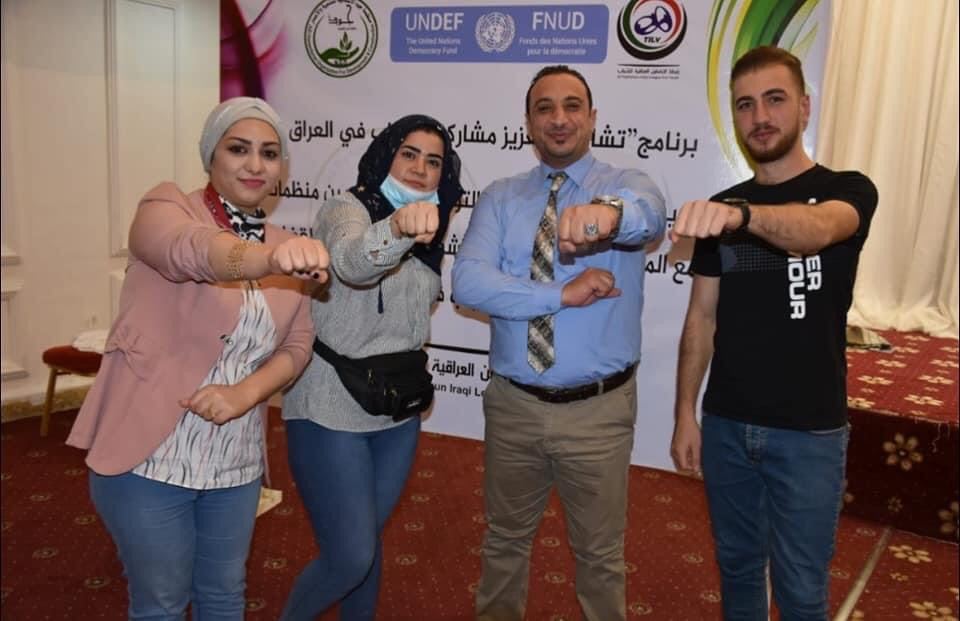“Doing journalistic work as a man in Nineveh is a very simple matter compared to when a woman does it, as she is restricted by the customs and traditions of the community and her famliy,” said TV presenter Yasmeen Muhammad.
On top of the deteriorated security and the frequent targeting of media workers, female media workers in Nineveh have to face other challenges such as social restrictions and tribal customs.
Yasmeen opines that those are among the reasons why there has been a decline in the number of female media workers in the Nineveh Province.
Stigma
“The negative perception by society in Nineveh is the biggest obstacle facing female media workers. That’s why most of them are thinking of giving up and abandoning the profession in order to avoid the pressures and problems that are placed in their path,” said Yasmeen.
Yasmeen’s message for all female media workers is that they should be “strong-willed” and not allow themselves to think about giving up the profession due to the negative perception by some "failed individuals" or when a specific outlet manager asks for sexual favours with her in exchange for employment.

Like other female journalists, Yasmine Muhammad has been subjected to harassment while doing her work. When she goes out into the street to take images for a report, many keep gazing at her as if there is something wrong with her. She has also been subjected to demands of sexual favours in exchange for being hired, but she has refused them.
“Of course, female journalists face unpleasant situations, but this should not mean that they should be prevented from practicing the profession of journalism. Journalism is too broad to be reduced to a specific outlet and its manager, the world is wide and one can find other entities to work for.”
Tribal customs in society
“Our societies are still dominated by a tribal character, which imposes traditions and customs that do not allow women to move freely and communicate widely. That is why there is a very small number of female journalists, especially in the Nineveh Province,” said the director of the Minorities Eye Agency, Imad Qusay Abbas.
Abbas adds that there has been an increase in the number of female journalists lately, but that the number is still far from sufficient. He says that among the reasons why the existence of female journalists is very important, is that they can convey the sufferings of women, especially those who face violence.
Hajar Ali, a journalism student at Mosul University, said: “It is very difficult for female journalists to work in Nineveh Province.”
there are conservative families that do not support the girl to reach a position and a place befitting her ambitions or enthusiasm
She pointed out that there are conservative families that do not support the girl to reach a position and a place befitting her ambitions or enthusiasm for "the argument of religion, customs and traditions that govern the Mosul street more than it is ruled by reason."
She says that there are conservative families that do not support their daughters to reach a position that befits her ambitions and enthusiasms, using religion and tradition as an excuse which dominate Mosul society more than reason does.
She calls for awareness campaigns on the issues and rights of women, taking into account their enthusiasm and aspirations, and adopting laws that make female education compulsory to prevent "those with narrow minds from controlling the fate of others."
Small number of female journalists
“Female journalists in Nineveh have proven their worth, but their number is small compared to the number of male journalists,” said the Nineveh Governor's advisor, Ali Shamo, and pointed out that their presence is limited to presentation and editing, and not management positions.
Female journalists in Nineveh have proven their worth, but their number is small
He explained to KirkukNow the need for the media in Nineveh to provide female training programs and workshops to be qualified to work in all joints of the media.
He says one of the reasons for the small number of female journalists in Nineveh is society's negative view of female journalists, especially by hard-line conservatives.
He also says that the Ministry of Culture failing to implement programs for female journalists, poor security conditions and the lack of media institutions in the province are among the reasons.
There are no official statistics for the number of female journalists in Nineveh, but two journalists reported to KirkukNow that there are approximately 15 female journalists in the province compared to 200 males.

Defiant attitude
"The obstacles facing female journalists in Nineveh are not new. Those who worked before us have faced the same and many of them managed to succeed, and here we are following their footsteps," says the journalist Sinan Samir.
She further told KirkukNow that "lamenting and surrendering will not do any good; it will lead us to nothing but bad things. We have no choice but to soldier on and face the obstacles head on. [...] It is indeed not reasonable for a female to claim her rights while sitting at home."
Yasmeen Mohammad stresses the need for female media workers in Nineveh Province to continue their work, because their presence means helping other women in solving their problems, as female journalists are better able to convey the real suffering of women due to the fact that she understands minute details that may be absent in the media, and can draw attention to issues that may be “embarrassing” because of customs and traditions.





